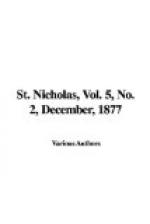His parents were very poor. When I tell you that they lived in a log-house you might think so, although some people live very comfortably in log-houses. But when I say that the snow drifted through the cracks in the roof until the chamber floor was fit to go sleighing on, and that it was so cold down-stairs that the gravy froze on the children’s plates while they were eating breakfast, and that the little girls had no shoes but cloth ones which their mother sewed to their stockings, you will see that they were poor indeed. Mrs. Boyd, Jack’s mother, generally went about her work with a shawl tied around her, and a comforter over her ears, on account of the ear-ache; and on the coldest days she kept Jack’s little sisters wrapped up from head to foot and perched on chairs near the stove, so they wouldn’t freeze. No; she didn’t feel much like telling them about Christmas, when she didn’t know but they would freeze to death, or, may be, starve, before that time. But Jack found out. He was going to school that winter, and one learns so much at school! He came home one night brimful of the news that Christmas would be there in three weeks, and that Santa Claus would come down chimneys and say, “I wish you Merry Christmas!” and then put lots of nice things in all the stockings.
Mrs. Boyd heard him talking, and was glad the children were enjoying themselves, but hoped from her heart that they wouldn’t expect anything, only to be bitterly disappointed. Most of that evening little Janey, the youngest girl, sat singing:
“Wis’ you
Melly Kitsmas!
Wis’ you
Melly Kitsmas!”
in a quaint, little minor key, that wasn’t plaintive enough to be sad, nor merry enough to be jolly, but only a sweet monotony of sounds and words showing that she was contented, and didn’t feel any of the dreadful aches and pains which sometimes distressed her so.
For a week, Jack wondered and mused within himself how he could get something for Christmas presents for his little sisters. He couldn’t make anything at home without their seeing it, nor at school without the teacher’s seeing it, or else the big boys plaguing him about it. Besides, he would rather buy something pretty, such as they had never seen before—china dolls in pink dresses, or something of that kind. One morning, however, Jack discovered some quail-tracks in the snow near the straw-stack, and he no longer wondered about ways and means, but in a moment was awake to the importance of this discovery. That very evening he made a wooden trap, and the next morning early set it near the stack, and laid an inviting train of wheat quite up to it, and scattered a little inside. He told his sisters, Mary and Janey, about the trap, but not about what he meant to do with the quails when he caught them. That afternoon Jack went to his trap, and to his unbounded joy found an imprisoned quail, frozen quite stiff. He quickly set the trap again, and ran to the house with his bird. All that evening he worked at quail-traps and made three more.




